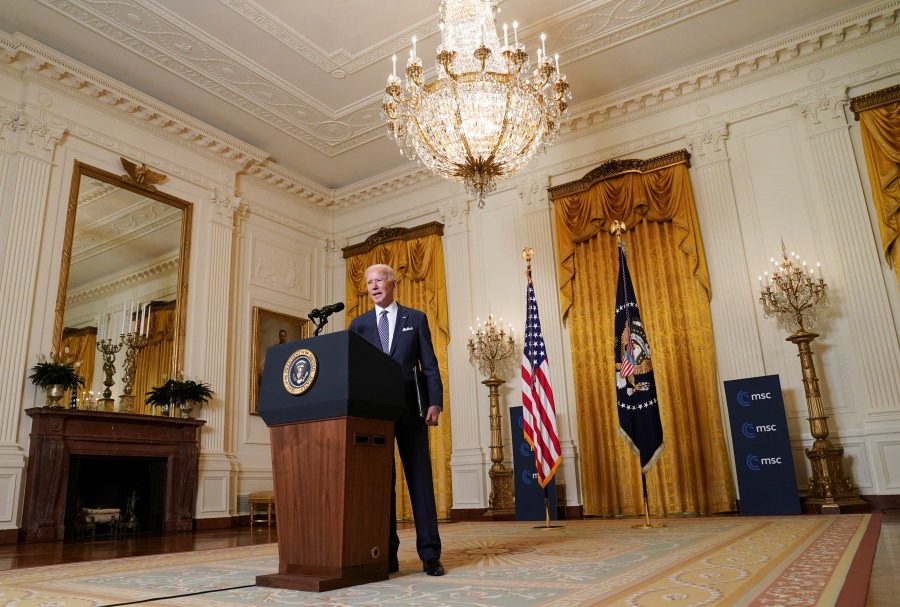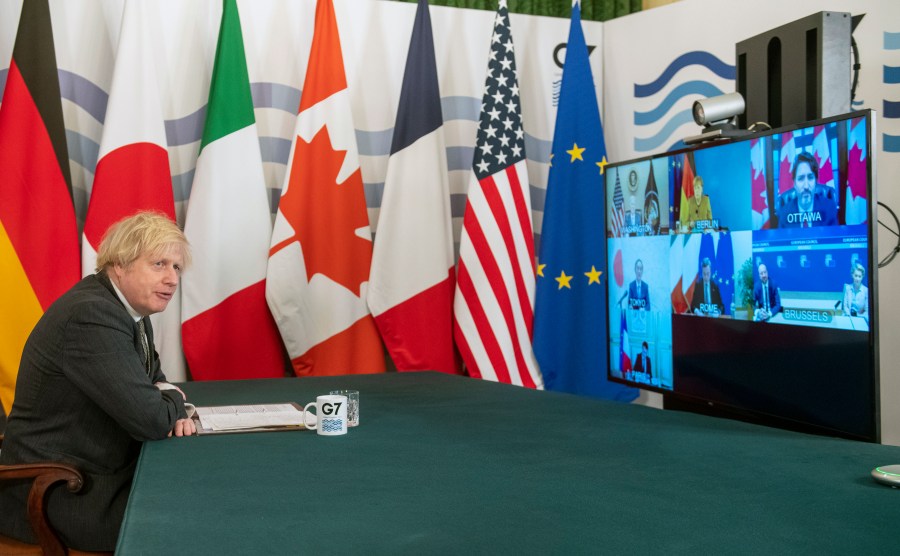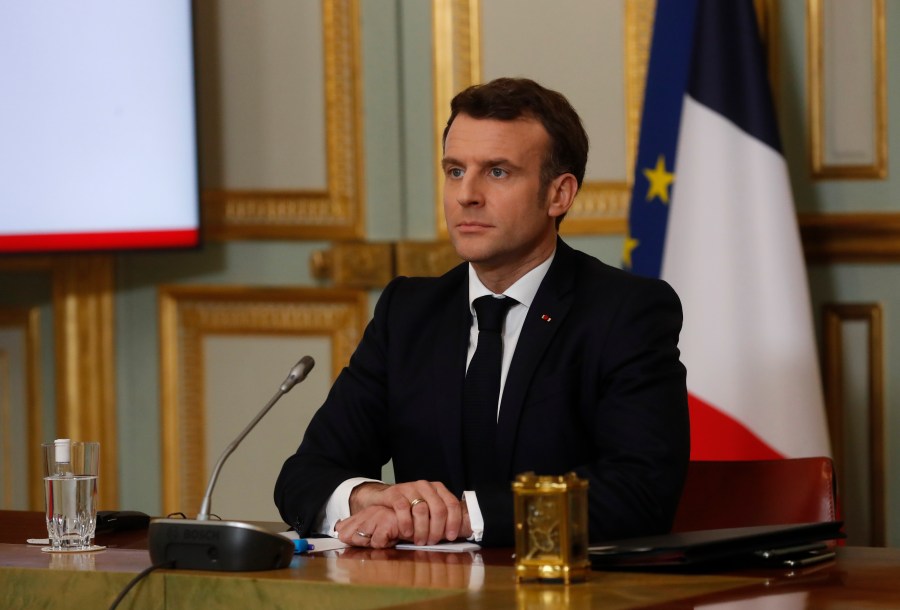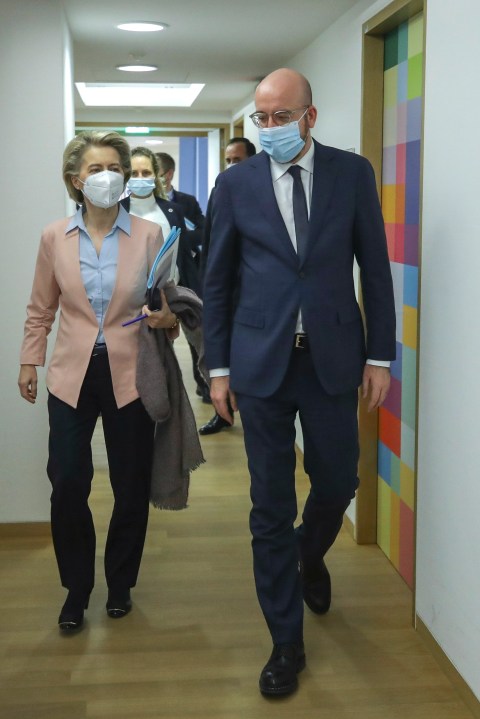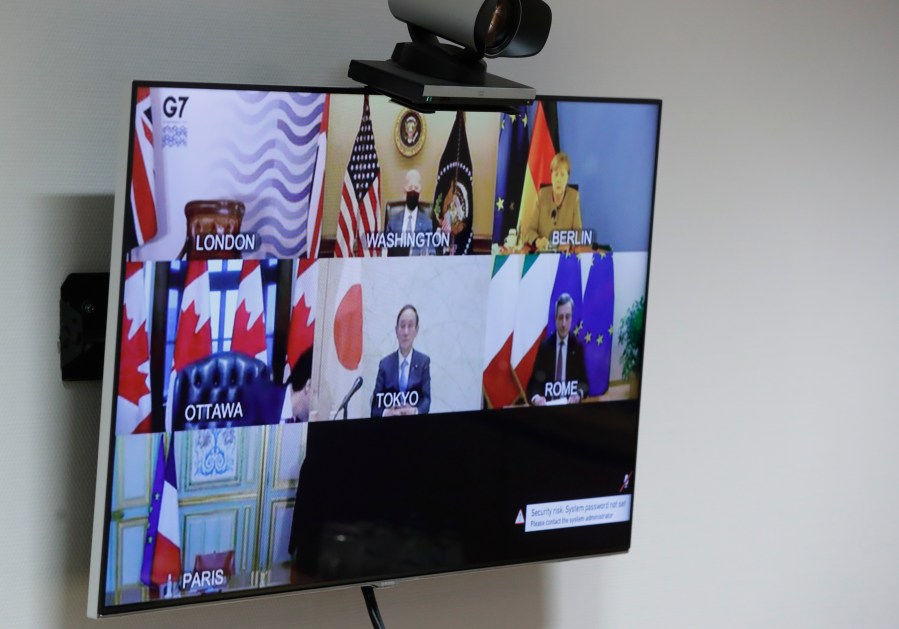WASHINGTON (NewsNation Now) — In his first big appearance on the global stage, President Joe Biden called on fellow world leaders to show together that “democracies can still deliver” as he underscored his administration’s determination to quickly turn the page on his predecessor’s “America First” approach.
Biden met via private videoconference with the leaders of the Group of Seven (G-7) economic powers Friday and afterward delivered a virtual speech addressing the Munich Security Conference.
The G-7, who control a little under half of the world’s economy, sought to look beyond the COVID-19 pandemic towards rebuilding their battered economies with free trade and to countering China’s “non-market oriented” policies.
In a virtual visit to Europe, Biden announced, “America’s back.” Biden vowed during his online speech to the Munich Security Conference that his administration was committed to ending transactional diplomacy and would promote democracy over autocracies. Biden said it was a critical time for the world’s democracies to “prove that our model isn’t a relic of our history.”
“We are in the midst of a fundamental debate about the future direction of our world,” Biden said in the address. That debate is “between those who argue that – given all of the challenges we face, from the fourth industrial revolution to a global pandemic – autocracy is the best way forward and those who understand that democracy is essential to meeting those challenges.”
“The United States is fully committed to our NATO alliance, and I welcome your growing investment in the military capabilities that enable our shared defenses,” Biden added. “An attack on one is an attack on all. That is our unshakeable vow.”
Biden said the U.S. military was conducting a comprehensive review of its military posture around the world, but he had lifted orders to withdraw U.S. troops from Germany – a decision by the Trump administration that was criticized by some allies.
In addition, Biden said he had lifted a cap imposed by the previous administration on the number of U.S. forces that could be based in Germany.
Biden said that the U.S. stands ready to rejoin talks about reentering the 2015 multilateral Iran nuclear deal abandoned by the Trump administration. The Biden administration announced Thursday its desire to reengage Iran, and it took action at the United Nations aimed at restoring policy to what it was before former President Donald Trump withdrew from the deal in 2018.
Iran informed the International Atomic Energy Agency this week that it would suspend voluntary implementation next week of a provision in the 2015 deal that allowed U.N. nuclear monitors to conduct inspections of undeclared sites in Iran at short notice unless the U.S. rolled back sanctions by Feb. 23.
“We must now make sure that a problem doesn’t arise of who takes the first step,” German chancellor Angela Merkel told reporters in Berlin after a videoconference of G-7 leaders. “If everyone is convinced that we should give this agreement a chance again, then ways should be found to get this agreement moving again.”
Biden also spoke out about the economic and national security challenges posed by Russia and China, as well as the two-decade war in Afghanistan, where he faces a May 1 deadline to remove the remaining 2,500 U.S. troops under a Trump administration negotiated peace agreement with the Taliban.
The growing power of China is reshaping the priorities of the 30-member North Atlantic Treaty Organization (NATO) alliance, which traditionally focused on the threat from Russia but now is seeking a consensus among Western nations that Beijing is no longer a benign trading partner.
“China and Russia are trying to re-write the rules of the road to benefit their own interests,” NATO Secretary-General Jans Stoltenberg told the Munich summit. “The rise of China is a defining issue for the transatlantic community, with potential consequences for our security, our prosperity and our way of life.”
As Biden underlined challenges facing the U.S. and its allies, Biden tried to make clear that he’s determined to repair a U.S.-Europe relationship that was strained under Trump.
‘I know the past few years have strained and tested the transatlantic relationship,” Biden said. “The United States is determined to reengage with Europe, to consult with you, to earn back our position of trust and leadership.”
At the G-7, administration officials said, Biden focused on what lies ahead for the international community as it tries to extinguish the public health and economic crises created by the coronavirus pandemic. He said the U.S. will soon begin releasing $4 billion for an international effort to bolster the purchase and distribution of coronavirus vaccine to poor nations.
Biden’s turn on the world stage came as the U.S. on Friday officially rejoined the Paris climate agreement, the largest international effort to curb global warming. Trump announced in June 2017 that he was pulling the U.S. out of the landmark accord, arguing that it would undermine the American economy.
Biden announced the U.S. intention of rejoining the accord on the first day of his presidency, but he had to wait 30 days for the move to go into effect. He has said that he will take considerations about climate change into every major domestic and foreign policy decision his administration faces.
To that end, Biden encouraged G-7 partners to make good on their pledges to COVAX, an initiative by the World Health Organization to improve access to vaccines, even as he reopens the U.S. spigot. There are growing calls for the Biden administration to distribute some U.S.-manufactured vaccine supplies overseas.
Trump had withdrawn the U.S. from WHO citing the belief that WHO covered up China’s missteps in handling the virus at the start of the public health crisis along with calls for reforms of the nongovernmental organization.
French President Emmanuel Macron has called on the U.S. and European nations to allocate up to 5% of current vaccine supplies to developing countries — the kind of vaccine diplomacy that China and Russia have begun deploying.
And earlier this week, U.N. Secretary-General Antonio Guterres sharply criticized the “wildly uneven and unfair” distribution of COVID-19 vaccines, noting 10 countries have administered 75% of all vaccinations.
Biden, who announced last week that the U.S. will have enough supply of the vaccine by the end of July to inoculate 300 million people, remains focused for now on making sure every American is vaccinated, administration officials say.
The Associated Press and Reuters contributed to this article: All reporting by Aamer Madhani/AP, Steve Holland/Reuters, and Robin Emmott/Reuters.
